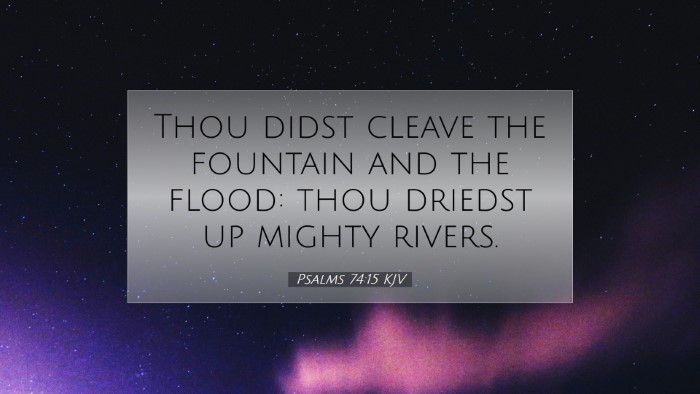Commentary on Psalms 74:15
Bible Verse: "Thou didst cleave the fountain and the flood: thou driedst up mighty rivers."
Introduction
The book of Psalms is considered a treasure trove of theological insights, worship expressions, and reflections on the human experience in relation to God. Psalms 74 is a spectacular expression of lamentation, highlighting the plight of God’s people in the face of adversarial forces. In verse 15, the psalmist recalls a moment of God’s miraculous intervention, emphasizing His omnipotence and sovereignty over creation.
Contextual Analysis
This Psalm is traditionally attributed to Asaph, a significant figure in the history of Israel's worship. Asaph, likely a Levitical musician, wrote this Psalm during a time of national calamity when the temple was destroyed. The opening verses express deep sorrow and confusion regarding the perceived abandonment by God and the desecration of His sanctuary. The psalmist’s recollection of God's past acts in verse 15 serves as a reminder of His faithfulness and power.
Memory of the Past
The present distress of the Israelites is met with reflections on God’s historical acts. The act of "cleaving the fountain and the flood" symbolizes not only the physical separation of waters but also God's control over chaotic natural forces.
Commentary Insights
Matthew Henry's Perspective
Matthew Henry emphasizes the importance of remembering God's past deliverances as a source of hope for the present trials. He notes that the "cleaving of the fountain" refers to God’s miraculous intervention during Israel's Exodus, where He split the Red Sea to provide a path for His people. It serves as a powerful metaphor illustrating that God can alter the course of nature for His faithful ones.
Albert Barnes' Exegesis
Albert Barnes elaborates on the notion of “the mighty rivers,” interpreting them as symbols of immense challenges that seem insurmountable to humanity. He points out that the imagery evokes both awe and reverence for God’s ability to intervene in seemingly impossible circumstances. Barnes stresses that such divine acts are displays of God’s power, which should inspire believers to place their trust in Him amid trials.
Adam Clarke's Commentary
Adam Clarke provides an additional layer of interpretation by noting the specific historical context where these events are rendered by the psalmist. Clarke observes that this verse not only recalls God’s past miracles but also serves as a meditation on His nature as a protector. He asserts that understanding God’s past actions reinforces the believers’ faith in His future work. Clarke emphasizes the value of historical remembrance in sustaining faith through adversity.
Theological Themes
- Divine Sovereignty: This verse illustrates God’s absolute control over natural and chaotic forces, reminding believers that nothing exists outside His dominion.
- Historical Remembrance: The Psalm teaches the necessity of recalling God's past faithfulness as a foundation for present hope.
- The Nature of God’s Intervention: God’s actions, such as "drying up mighty rivers," suggest a profound ability to provide rescue and deliverance when hope seems lost.
Application for Believers
This verse speaks powerfully to believers today, emphasizing that in times of despair, recalling God’s past interventions can strengthen faith. Past deliverances serve as testimonies to God’s faithfulness, encouraging believers to persevere through current challenges. Pastors, theologians, and students can glean from this to teach resilience in faith, alongside the importance of reminding their congregations and communities of God’s enduring promises.
Conclusion
Psalms 74:15 indeed encapsulates a profound truth about the character of God as a historical actor in the world. The insights drawn from public domain commentaries illuminate the depth of this verse, encouraging believers to engage with Scripture in a way that fosters personal and communal resilience. The assurance that God who once cleaved the great waters and dried mighty rivers is the same God who is present in times of trouble is an enduring truth that should resonate in the hearts of all who seek Him.


